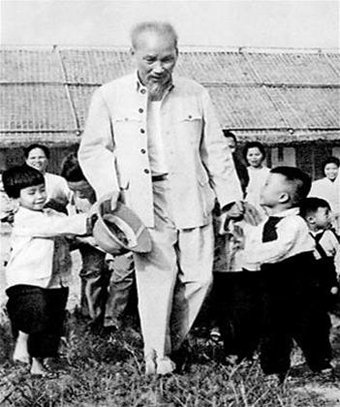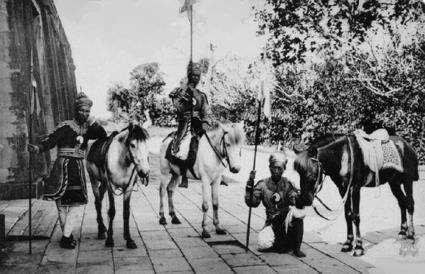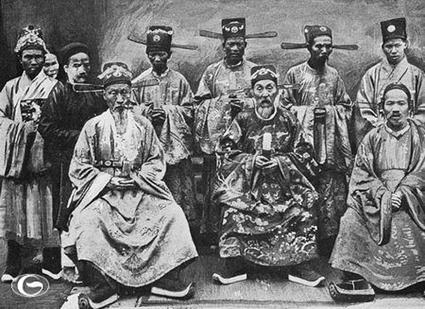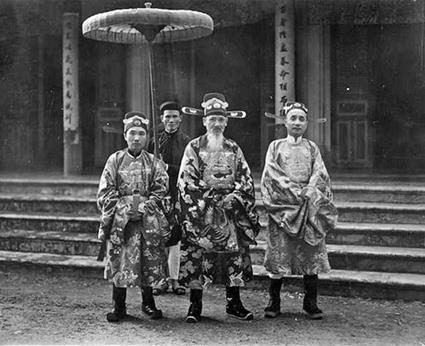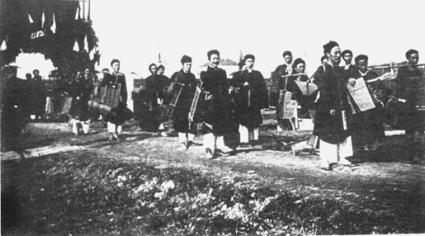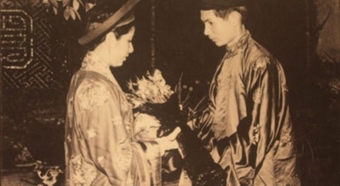 |
A bridal entourage in old-time Hanoi__Photo: Internet |
Do Danh Huan, M.Sc
History Institute
Human rights were prescribed in Vietnam’s ancient laws, especially “Quoc Trieu Hinh Luat” (the National Criminal Code of the Le Dynasty, also commonly known as Hong Duc Code) and “Hoang Viet Luat Le” (The Royal Laws and Regulations of Vietnam, also called Gia Long Code), as personal freedoms and interests of people of various social strata. These personal rights and interests were recognized by the feudal laws in land ownership and inheritance as well as in marriage and family.
Human rights in land ownership and inheritance
In Vietnam’s traditional economy of agricultural production, land was considered not only the important property of the monarchies but also the most valuable property and means of production of people in the Vietnamese history. As a result, the laws of the Le and Nguyen dynasties contained many provisions on land inheritance and ownership, binding on all people, male and female, rich and poor, disabled and non-disabled.
Land ownership
The rulers of the Le dynasty recognized people’s right to receive cultivation land by providing in the Chapter entitled Dien San (Real Estates) of Quoc Trieu Hinh Luat that: “Males aged full sixteen are entitled to receive land, that is the regulation which must be followed by future generations.... The law is simple and clear-cut, binding on all people, the rich and the poor... Those who oppose to this shall be punished by 80 strokes of the heavy stick.”
The feudal states also permitted land owners to sell or mortgage their land as a commodity. Quoc Trieu Hinh Luat clearly stated: “Now as before, if the land sellers or mortgagors are not fully paid even when their land is sold or mortgaged, they still have the right to till that land until they are fully paid by the land buyers or mortgagees. Those who oppose to this regulation shall be subject to 80 strokes of the heavy stick. The state will not tolerate them.”
Land inheritance
Like offspring, adopted children have the right to inherit land, which was clearly defined in Article 7, Chapter Dien San of Quoc Trieu Hinh Luat: “If children are recognized in writing as adopted children, they are entitled to inherit the real estate like offspring when their adoptive parents die without testament if it is so stated in the adoption documents. If the family clan chiefs fail to abide by this regulation, they shall be subject to 50 lashes of the cane and have their rank reduced one degree. If the adoption documents do not state that the adopted children will be given the real estate, this law shall not apply.”
The law also provided that if a couple die without heirs, their estates would be consigned to their most influential and closest relatives for arrangement of inheritance for selected heirs who were obliged to worship the deceased and look after their tombs.
The land inheritance between husband and wife was clearly defined by the Code: “If a husband has a child with his first wife while having no child with his second wife or a wife has a child with her first husband while having no child with her second husband, the couple’s real estates shall belong to the child of the first wife or the first husband, if the husband dies without testament. If the second wife or the second husband illegally divides the estates, she or he shall be punished by 50 lashes of the cane and have their rank reduced one degree” (Article 1), or “If either spouse of a childless couple dies without testament while their real estates are illegally divided to other persons or kept for cult worshiping, the wrong-doers shall be punished by 50 lashes of the cane and have their rank reduced one degree and their relatives are not allowed to keep the real estates for cult worshiping.” (Article 2).
Meanwhile, Article 4 of Quoc Trieu Hinh Luat, supplementing the provisions on cult-portion heritage, provided the female’s right to inherit real estates: “If the keeper of cult-portion heritage has the eldest son, the cult-portion heritage shall be given to the latter. If he has no eldest son, his elder daughter is entitled to one-twentieth of the cult-portion land” or “If a couple has two sons but the eldest son has only daughters while the younger brother has a son, the cult-portion heritage may be consigned to the son of the younger brother. If the younger brother’s son only has daughters, the cult-portion heritage previously given to him shall be returned to the eldest daughter of the eldest brother” (Supplement to Article 4 of Quoc Trieu Hinh Luat).
The two ancient feudal codes of Vietnam also recognized the disabled’s right to inherit real estates, providing: “If a couple give birth to a son who has been assigned to keep the cult-portion heritage but has only one daughter, while his concubine gives birth to a disabled son who latter gets married and gives birth to a son, the cult-portion real estate shall be given to such grandson.”
Human rights in marriage and family law
Under Vietnam’s ancient feudal law, people also had the rights to marry and live harmoniously in their families, which were protected by the state.
Hoang Viet Luat Le of the Nguyen dynasty clearly provided: “If a young man aged 20 or under and a young girl still living with her parents are forced to marry each other against their own will, the person who is in charge of the marriage shall be punished” or “If the bride’s family deceives the bridegroom’s by fraudulently substituting the true bride, who is a disabled person, with her sister, who is not disabled, in the pre-wedding meet with the latter, the person who is in charge of the marriage shall be punished by 80 strokes of the heavy stick and the betrothal money shall be returned. If the bridegroom’s family commits the same or similar fraud such as substituting the disabled bridegroom by the adopted son at a pre-wedding meet with the bride’s, punishment one degree heavier shall be imposed.”
The disabled’s right to marry was protected by the feudal state as stated in the said Code that: “If either of a young couple is discovered as being handicapped, the two families should carefully consider the case and decide at their own will to baptize their marriage or not. If they agree, their wedding shall be organized according to set ceremonies.”
Under the Nguyen dynasty, the mortgage or trading of wives or daughters was strongly condemned and committers would be severely punished. Hoang Viet Luat Le clearly stated: “Husbands who mortgage their wives to others as concubines, are brazen-faced, thus disrupting the moral principles, shall be punished by 80 strokes of the heavy stick. Parents who sell their daughters to others as their concubines shall be subject to 60 strokes of the heavy stick.”
Those who lend a hand to acts of mortgaging or trafficking in women would also be severely punished by law: “Those who mortgage wives or daughters of others shall be similarly punished. Those who mortgage wives of other persons and the former’s husbands shall be punished by 80 strokes of the heavy stick. Those who mortgage daughters of other persons and the former’s parents shall be subject to 60 strokes of the heavy stick.”
This ancient law also voiced strong protection of women against appropriation and cruel acts of village tyrants: “Those village tyrants who take advantage of their positions and influence to appropriate or tread on the necks of the wives and daughters of innocent people, illegally seize them to be their concubines shall be sentenced to ‘giao gian hau’ (death by strangulation after the appellate trial)... Those village tyrants who abuse their positions and influence to cruelly assault or publicly appropriate wives and daughters of innocent people as their concubines shall be sentenced to ‘giao’ (death by strangulation).”
The accomplices were also severely sentenced to “100 strokes of the heavy stick and three years of penal servitude, if they directly involved in appropriating women and daughters of innocent people,” or to “70 strokes of the heavy stick and one and a half years of penal servitude, if they are lured to assist the chief culprits in carrying their things.” Under the law, those who kidnapped women and carry home would be sentenced to “luu day” (exile to a remote location) while their accomplices would be sentenced to “100 strokes of the heavy stick and three years of servitude, if they act as accessories to the culprits,” or to “80 strokes of the heavy stick if they assist the culprits in carrying things.”
Hoang Viet Luat Le of the Nguyen dynasty protected matrilocal men, who lived in their in-laws’, by providing: “Those who oust their sons-in-law from their houses for the purpose of marrying their daughters to others or selecting other matrilocal men shall be subject to 100 strokes of the heavy stick while their daughters shall be found no guilty provided that they do not collude with their parents in committing this criminal act.”
So, under the feudal regimes in Vietnam, especially the Le and Nguyen dynasties, the principal basic human rights of people were clearly defined by law and protected by the states.-
